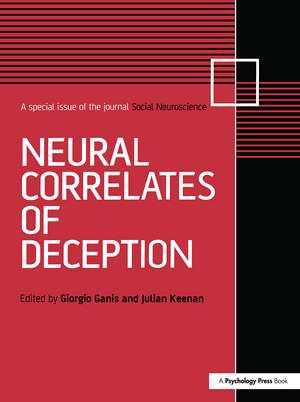Neural Correlates of Deception: A Special Issue of Social Neuroscience: Special Issues of Social Neuroscience
Editat de Giorgio Ganis, Julian Keenanen Limba Engleză Hardback – 7 dec 2009
Numerous questions are raised by these studies. First, is deception a unitary phenomenon, and are all lies the same? If there are different types of lies and there are individual differences in deception, can lies be detected reliably in single individuals? Second, are deception processes special in any way or do they depend only on a set of general-purpose cognitive and neural processes? Third, is it valid to study deception in the laboratory, and to what extent can laboratory studies be designed to resemble real-life deception situations? Fourth, are different cognitive and neural measures associated with deception affected equally by different factors? Can we devise reliable methods to detect deception by exploiting this knowledge? These questions provide important directions for future research. Establishing the brain correlates of deception behaviour will be challenging, but already we have made great strides.
Preț: 684.82 lei
Preț vechi: 916.76 lei
-25% Nou
Puncte Express: 1027
Preț estimativ în valută:
131.04€ • 137.10$ • 108.86£
131.04€ • 137.10$ • 108.86£
Comandă specială
Livrare economică 13-27 martie
Doresc să fiu notificat când acest titlu va fi disponibil:
Se trimite...
Preluare comenzi: 021 569.72.76
Specificații
ISBN-13: 9781848727120
ISBN-10: 1848727127
Pagini: 116
Dimensiuni: 210 x 280 mm
Greutate: 0.68 kg
Ediția:New.
Editura: Taylor & Francis
Colecția Psychology Press
Seria Special Issues of Social Neuroscience
Locul publicării:Oxford, United Kingdom
ISBN-10: 1848727127
Pagini: 116
Dimensiuni: 210 x 280 mm
Greutate: 0.68 kg
Ediția:New.
Editura: Taylor & Francis
Colecția Psychology Press
Seria Special Issues of Social Neuroscience
Locul publicării:Oxford, United Kingdom
Cuprins
G. Ganis, J.P. Keenan, The Cognitive Neuroscience of Deception. J.B. Allen, R. Mertens, Limitations to the Detection of Deception: True and False Recollections are Poorly Distinguished Using an Event-related Potential Procedure. M.A. Lui, J.P. Rosenfeld, A.H. Ryan, Thirty-Site P300 Scalp Distribution, Amplitude Variance Across Sites, and Amplitude in Detection of Deceptive Concealment of Multiple Guilty Items. F.A. Kozel, K.A. Johnson, S.J. Laken, E.L. Grenesko, J.A. Smith, J. Walker, M.S. George, Can Simultaneously Acquired Electrodermal Activity Improve Accuracy of fMRI Detection of Deception? J.G. Hakun, K. Ruparel, D. Seelig, E. Busch, J.W. Loughead, R.C. Gur, D.D. Langleben, Resume Query Test: Towards Clinical Trials of Lie Detection with fMRI. G. Monteleone, K.L. Phan, H. Nusbaum, D. Fitzgerald, J. Stockton Irick, S. Fienberg, J. Cacioppo, Detection of Deception Using Functional Magnetic Resonance Imaging: Well Above Chance, Though Well Below Perfection. G. Ganis, R.R. Morris, S.M. Kosslyn, Neural Processes Underlying Self- and Other-related Lies: An Individual Difference Approach using fMRI. C.J. Morgan, J.B. LeSage, S.M. Kosslyn, Types of Deception Revealed by Individual Differences in Cognitive Abilities. K.J. Kelly, E. Murray, V. Barrios, J. Gorman, G. Ganis, J.P. Keenan, The Effect of Deception on Motor Cortex Excitability.
Descriere
Deception, also known as "lying", is a pervasive and fundamental social behavior in which a person attempts to persuade another to accept as true what the deceiver believes to be untrue. This special issue samples diverse new empirical studies on the cognitive and neural processes associated with producing lies using a variety of paradigms, techniques, and measures. Several broad issues are addressed, such as the existence of different types of lies and individual differences in deception, laboratory versus field studies of deception, single individual versus group data approaches, and the potential of neuroscience-based lie detection.




